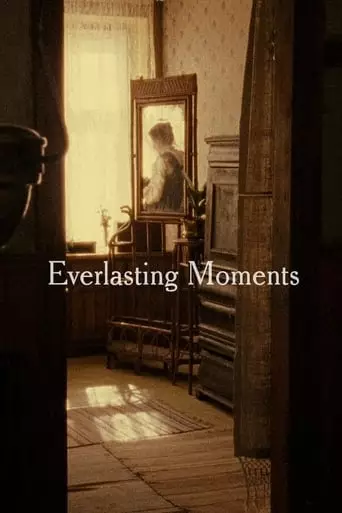In a time of social change and unrest, war and poverty, a young working class woman, Maria, wins a camera in a lottery. The decision to keep it alters her whole life.
Everlasting Moments, directed by Jan Troell, is a poignant drama that captures the life of Maria Larsson, a woman in early 20th-century Sweden who discovers a passion for photography. Set against the backdrop of a working-class neighborhood, the film chronicles Maria’s journey from the mundane, often painful existence shaped by her alcoholic husband Siggi, to the transformative power of her newfound artistic outlet. The plot is structured around Maria’s emotional and personal growth, as she finds solace and empowerment through photography, which allows her to express her inner life and reshape her understanding of the world.
Themes:
- Art as Liberation: The central theme of Everlasting Moments is the way photography acts as a tool of personal liberation for Maria. The film explores how artistic expression can break through the confines of daily struggles and domestic turmoil, offering a new lens through which to view the world.
- Women’s Empowerment: The film also delves into gender roles and expectations. Maria’s exploration of photography offers a quiet rebellion against societal norms, showing how she uses her passion to carve out an identity beyond the limitations of her marriage.
- Family Dynamics: The complex dynamics between Maria, her husband Siggi, and the children they raise are a key component of the film. It paints a sensitive portrayal of marital tensions, love, and dependence, exploring the ways that relationships can evolve, sometimes out of necessity, sometimes out of love, but always rooted in deeply personal experience.
- The Power of Memory and Time: The film’s use of photography also symbolizes memory, as Maria’s photographs freeze moments in time, reflecting the fleeting nature of life. It emphasizes the significance of preserving moments that define us, even when they are just fragments of an ordinary life.
Impact of the Film: Everlasting Moments is a masterclass in understated drama, with its subtle performances, reflective pacing, and evocative cinematography. Jan Troell’s direction brings the story to life with sensitivity and a deep respect for his characters. The film is both intimate and universal, capturing personal transformation in a historical context. It highlights the emotional power of photography and the quiet moments that often define a life, offering a reminder of how even in hardship, beauty can emerge
The film’s lasting impact is the way it encourages viewers to reflect on their own lives and the importance of finding beauty in the mundane. It is a cinematic celebration of personal agency and creative expression, suggesting that even the most ordinary lives can hold extraordinary meaning when viewed from the right perspective
10 Reasons to Watch Everlasting Moments (2008):
- A Unique Historical Perspective: Everlasting Moments offers a glimpse into early 20th-century Sweden, showcasing the struggles of a working-class family and the societal pressures of the time.
- Powerful Performance: Maria Heiskanen’s portrayal of Maria is nuanced and heartfelt, capturing the character’s emotional depth and transformation.
- Cinematography: The film’s beautiful cinematography, especially its use of light and shadow, reflects the themes of photography and memory.
- Exploration of Photography: The film’s focus on photography as both a personal hobby and an artistic outlet is captivating, making it a must-watch for art lovers.
- Emotional Journey: The film follows Maria’s emotional growth, making it a powerful exploration of resilience and self-discovery.
- Quiet, Unassuming Drama: It is a slow-burning film that doesn’t rely on flashy techniques but instead builds emotional resonance through its characters and story.
- Strong Female Lead: Maria’s journey toward independence and self-expression resonates strongly with themes of female empowerment.
- Historical Relevance: The film offers insight into the historical context of Sweden in the early 1900s, highlighting the evolving role of women during that time.
- Cultural Significance: It’s an important piece of Swedish cinema, with an intimate portrayal of ordinary people finding extraordinary moments of beauty and meaning.
- Rewatchability: The film’s meditative pace and emotional depth make it one you’ll want to revisit, discovering new layers with each viewing.
What Will You Feel After Watching Everlasting Moments (2008)?
After watching Everlasting Moments, you will likely feel moved by the portrayal of Maria’s quiet strength and transformation. The film is tender and reflective, offering a sense of catharsis as you witness a woman’s gradual journey toward self-realization. You may also feel a sense of appreciation for the small, beautiful moments in life that we often overlook, along with a renewed sense of the power of art to transform and define our existence. The film’s quiet, lingering emotional pull makes it a poignant meditation on love, family, and personal growth.

